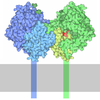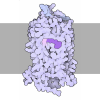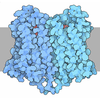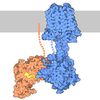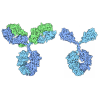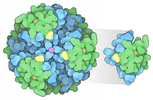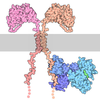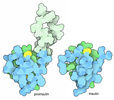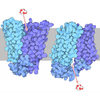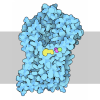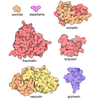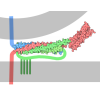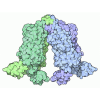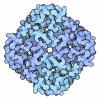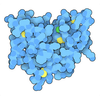+ Open data
Open data
- Basic information
Basic information
| Entry | Database: PDB / ID: 7vl8 | ||||||
|---|---|---|---|---|---|---|---|
| Title | Cryo-EM structure of the Apo CCR1-Gi complex | ||||||
 Components Components |
| ||||||
 Keywords Keywords | MEMBRANE PROTEIN / GPCR / CCR1 / Chemokine Receptor / MEMBRNE PROTEIN | ||||||
| Function / homology |  Function and homology information Function and homology informationchemokine (C-C motif) ligand 7 binding / chemokine (C-C motif) ligand 5 binding / chemokine receptor activity / negative regulation of bone mineralization / phosphatidylinositol-4,5-bisphosphate phospholipase C activity / C-C chemokine receptor activity / chemokine-mediated signaling pathway / C-C chemokine binding / positive regulation of calcium ion transport / positive regulation of osteoclast differentiation ...chemokine (C-C motif) ligand 7 binding / chemokine (C-C motif) ligand 5 binding / chemokine receptor activity / negative regulation of bone mineralization / phosphatidylinositol-4,5-bisphosphate phospholipase C activity / C-C chemokine receptor activity / chemokine-mediated signaling pathway / C-C chemokine binding / positive regulation of calcium ion transport / positive regulation of osteoclast differentiation / positive regulation of monocyte chemotaxis / Chemokine receptors bind chemokines / dendritic cell chemotaxis / Interleukin-10 signaling / exocytosis / monocyte chemotaxis / G protein-coupled receptor signaling pathway, coupled to cyclic nucleotide second messenger / adenylate cyclase inhibitor activity / positive regulation of protein localization to cell cortex / T cell migration / Adenylate cyclase inhibitory pathway / D2 dopamine receptor binding / response to prostaglandin E / G protein-coupled serotonin receptor binding / adenylate cyclase regulator activity / adenylate cyclase-inhibiting serotonin receptor signaling pathway / cellular response to forskolin / regulation of mitotic spindle organization / cell chemotaxis / Regulation of insulin secretion / calcium-mediated signaling / positive regulation of cholesterol biosynthetic process / negative regulation of insulin secretion / G protein-coupled receptor binding / response to peptide hormone / adenylate cyclase-inhibiting G protein-coupled receptor signaling pathway / response to wounding / adenylate cyclase-modulating G protein-coupled receptor signaling pathway / centriolar satellite / G-protein beta/gamma-subunit complex binding / cytokine-mediated signaling pathway / Olfactory Signaling Pathway / intracellular calcium ion homeostasis / chemotaxis / Activation of the phototransduction cascade / G beta:gamma signalling through PLC beta / Presynaptic function of Kainate receptors / Thromboxane signalling through TP receptor / G protein-coupled acetylcholine receptor signaling pathway / Activation of G protein gated Potassium channels / Inhibition of voltage gated Ca2+ channels via Gbeta/gamma subunits / G-protein activation / G beta:gamma signalling through CDC42 / Prostacyclin signalling through prostacyclin receptor / Glucagon signaling in metabolic regulation / G beta:gamma signalling through BTK / Synthesis, secretion, and inactivation of Glucagon-like Peptide-1 (GLP-1) / ADP signalling through P2Y purinoceptor 12 / photoreceptor disc membrane / Sensory perception of sweet, bitter, and umami (glutamate) taste / Glucagon-type ligand receptors / GDP binding / Adrenaline,noradrenaline inhibits insulin secretion / Vasopressin regulates renal water homeostasis via Aquaporins / Glucagon-like Peptide-1 (GLP1) regulates insulin secretion / calcium ion transport / G alpha (z) signalling events / ADP signalling through P2Y purinoceptor 1 / cellular response to catecholamine stimulus / ADORA2B mediated anti-inflammatory cytokines production / G beta:gamma signalling through PI3Kgamma / adenylate cyclase-activating dopamine receptor signaling pathway / Cooperation of PDCL (PhLP1) and TRiC/CCT in G-protein beta folding / cell-cell signaling / GPER1 signaling / G-protein beta-subunit binding / cellular response to prostaglandin E stimulus / heterotrimeric G-protein complex / Inactivation, recovery and regulation of the phototransduction cascade / G alpha (12/13) signalling events / extracellular vesicle / sensory perception of taste / Thrombin signalling through proteinase activated receptors (PARs) / signaling receptor complex adaptor activity / positive regulation of cytosolic calcium ion concentration / G protein activity / retina development in camera-type eye / GTPase binding / Ca2+ pathway / fibroblast proliferation / midbody / cell cortex / High laminar flow shear stress activates signaling by PIEZO1 and PECAM1:CDH5:KDR in endothelial cells / G alpha (i) signalling events / G alpha (s) signalling events / phospholipase C-activating G protein-coupled receptor signaling pathway / G alpha (q) signalling events / Hydrolases; Acting on acid anhydrides; Acting on GTP to facilitate cellular and subcellular movement / Ras protein signal transduction / cell surface receptor signaling pathway Similarity search - Function | ||||||
| Biological species |  Homo sapiens (human) Homo sapiens (human) | ||||||
| Method | ELECTRON MICROSCOPY / single particle reconstruction / cryo EM / Resolution: 2.9 Å | ||||||
 Authors Authors | Shao, Z. / Shen, Q. / Mao, C. / Yao, B. / Chen, L. / Zhang, H. / Shen, D. / Zhang, C. / Li, W. / Du, X. ...Shao, Z. / Shen, Q. / Mao, C. / Yao, B. / Chen, L. / Zhang, H. / Shen, D. / Zhang, C. / Li, W. / Du, X. / Li, F. / Ma, H. / Chen, Z. / Xu, H.E. / Ying, S. / Zhang, Y. / Shen, H. | ||||||
| Funding support |  China, 1items China, 1items
| ||||||
 Citation Citation |  Journal: Nat Chem Biol / Year: 2022 Journal: Nat Chem Biol / Year: 2022Title: Identification and mechanism of G protein-biased ligands for chemokine receptor CCR1. Authors: Zhehua Shao / Qingya Shen / Bingpeng Yao / Chunyou Mao / Li-Nan Chen / Huibing Zhang / Dan-Dan Shen / Chao Zhang / Weijie Li / Xufei Du / Fei Li / Honglei Ma / Zhi-Hua Chen / H Eric Xu / ...Authors: Zhehua Shao / Qingya Shen / Bingpeng Yao / Chunyou Mao / Li-Nan Chen / Huibing Zhang / Dan-Dan Shen / Chao Zhang / Weijie Li / Xufei Du / Fei Li / Honglei Ma / Zhi-Hua Chen / H Eric Xu / Songmin Ying / Yan Zhang / Huahao Shen /  Abstract: Biased signaling of G protein-coupled receptors describes an ability of different ligands that preferentially activate an alternative downstream signaling pathway. In this work, we identified and ...Biased signaling of G protein-coupled receptors describes an ability of different ligands that preferentially activate an alternative downstream signaling pathway. In this work, we identified and characterized different N-terminal truncations of endogenous chemokine CCL15 as balanced or biased agonists targeting CCR1, and presented three cryogenic-electron microscopy structures of the CCR1-G complex in the ligand-free form or bound to different CCL15 truncations with a resolution of 2.6-2.9 Å, illustrating the structural basis of natural biased signaling that initiates an inflammation response. Complemented with pharmacological and computational studies, these structures revealed it was the conformational change of Tyr291 (Y291) in CCR1 that triggered its polar network rearrangement in the orthosteric binding pocket and allosterically regulated the activation of β-arrestin signaling. Our structure of CCL15-bound CCR1 also exhibited a critical site for ligand binding distinct from many other chemokine-receptor complexes, providing new insights into the mode of chemokine recognition. | ||||||
| History |
|
- Structure visualization
Structure visualization
| Structure viewer | Molecule:  Molmil Molmil Jmol/JSmol Jmol/JSmol |
|---|
- Downloads & links
Downloads & links
- Download
Download
| PDBx/mmCIF format |  7vl8.cif.gz 7vl8.cif.gz | 216.4 KB | Display |  PDBx/mmCIF format PDBx/mmCIF format |
|---|---|---|---|---|
| PDB format |  pdb7vl8.ent.gz pdb7vl8.ent.gz | 164.6 KB | Display |  PDB format PDB format |
| PDBx/mmJSON format |  7vl8.json.gz 7vl8.json.gz | Tree view |  PDBx/mmJSON format PDBx/mmJSON format | |
| Others |  Other downloads Other downloads |
-Validation report
| Arichive directory |  https://data.pdbj.org/pub/pdb/validation_reports/vl/7vl8 https://data.pdbj.org/pub/pdb/validation_reports/vl/7vl8 ftp://data.pdbj.org/pub/pdb/validation_reports/vl/7vl8 ftp://data.pdbj.org/pub/pdb/validation_reports/vl/7vl8 | HTTPS FTP |
|---|
-Related structure data
| Related structure data |  32020MC  7vl9C  7vlaC M: map data used to model this data C: citing same article ( |
|---|---|
| Similar structure data | Similarity search - Function & homology  F&H Search F&H Search |
- Links
Links
- Assembly
Assembly
| Deposited unit | 
|
|---|---|
| 1 |
|
- Components
Components
-Guanine nucleotide-binding protein ... , 3 types, 3 molecules ABG
| #1: Protein | Mass: 40414.047 Da / Num. of mol.: 1 Source method: isolated from a genetically manipulated source Source: (gene. exp.)  Homo sapiens (human) / Gene: GNAI1 / Cell (production host): SF9 / Production host: Homo sapiens (human) / Gene: GNAI1 / Cell (production host): SF9 / Production host:  |
|---|---|
| #2: Protein | Mass: 37728.152 Da / Num. of mol.: 1 Source method: isolated from a genetically manipulated source Source: (gene. exp.)  Homo sapiens (human) / Gene: GNB1 / Cell (production host): SF9 / Production host: Homo sapiens (human) / Gene: GNB1 / Cell (production host): SF9 / Production host:  |
| #3: Protein | Mass: 7861.143 Da / Num. of mol.: 1 Source method: isolated from a genetically manipulated source Source: (gene. exp.)  Homo sapiens (human) / Gene: GNG2 / Cell (production host): SF9 / Production host: Homo sapiens (human) / Gene: GNG2 / Cell (production host): SF9 / Production host:  |
-Protein / Antibody / Non-polymers , 3 types, 3 molecules RS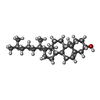

| #4: Protein | Mass: 42203.547 Da / Num. of mol.: 1 Source method: isolated from a genetically manipulated source Source: (gene. exp.)  Homo sapiens (human) / Gene: CCR1, CMKBR1, CMKR1, SCYAR1 / Cell (production host): SF9 / Production host: Homo sapiens (human) / Gene: CCR1, CMKBR1, CMKR1, SCYAR1 / Cell (production host): SF9 / Production host:  |
|---|---|
| #5: Antibody | Mass: 27340.482 Da / Num. of mol.: 1 Source method: isolated from a genetically manipulated source Source: (gene. exp.)  Homo sapiens (human) / Production host: Homo sapiens (human) / Production host:  |
| #6: Chemical | ChemComp-CLR / |
-Details
| Has ligand of interest | Y |
|---|---|
| Has protein modification | Y |
-Experimental details
-Experiment
| Experiment | Method: ELECTRON MICROSCOPY |
|---|---|
| EM experiment | Aggregation state: PARTICLE / 3D reconstruction method: single particle reconstruction |
- Sample preparation
Sample preparation
| Component | Name: Apo form CCR1-Gi complex / Type: COMPLEX / Entity ID: #1-#5 / Source: RECOMBINANT |
|---|---|
| Source (natural) | Organism:  Homo sapiens (human) Homo sapiens (human) |
| Source (recombinant) | Organism:  |
| Buffer solution | pH: 7.5 |
| Specimen | Embedding applied: NO / Shadowing applied: NO / Staining applied: NO / Vitrification applied: YES |
| Vitrification | Instrument: FEI VITROBOT MARK IV / Cryogen name: ETHANE |
- Electron microscopy imaging
Electron microscopy imaging
| Experimental equipment |  Model: Titan Krios / Image courtesy: FEI Company |
|---|---|
| Microscopy | Model: FEI TITAN KRIOS |
| Electron gun | Electron source:  FIELD EMISSION GUN / Accelerating voltage: 300 kV / Illumination mode: FLOOD BEAM FIELD EMISSION GUN / Accelerating voltage: 300 kV / Illumination mode: FLOOD BEAM |
| Electron lens | Mode: BRIGHT FIELD |
| Image recording | Electron dose: 62 e/Å2 / Detector mode: COUNTING / Film or detector model: GATAN K2 SUMMIT (4k x 4k) |
- Processing
Processing
| Software | Name: PHENIX / Version: 1.18_3845: / Classification: refinement | ||||||||||||||||||||||||
|---|---|---|---|---|---|---|---|---|---|---|---|---|---|---|---|---|---|---|---|---|---|---|---|---|---|
| EM software |
| ||||||||||||||||||||||||
| CTF correction | Type: PHASE FLIPPING AND AMPLITUDE CORRECTION | ||||||||||||||||||||||||
| 3D reconstruction | Resolution: 2.9 Å / Resolution method: FSC 0.143 CUT-OFF / Num. of particles: 391181 / Symmetry type: POINT | ||||||||||||||||||||||||
| Atomic model building | Protocol: FLEXIBLE FIT / Space: REAL | ||||||||||||||||||||||||
| Atomic model building | PDB-ID: 6DO1 Accession code: 6DO1 / Source name: PDB / Type: experimental model | ||||||||||||||||||||||||
| Refine LS restraints |
|
 Movie
Movie Controller
Controller





 PDBj
PDBj


